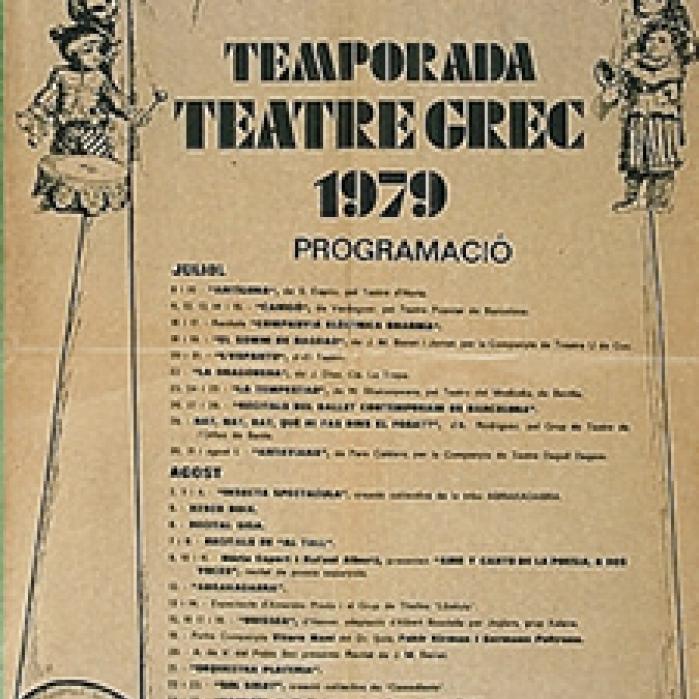
The first mayoral elections after the restoration of democracy were held in April 1979. The left won power, and Rafael Planas was appointed as Councillor for Culture, whilst Joan-Anton Benach was named as his delegate. That first team, having just arrived at City Hall, decided to revive the Grec, which had not taken place the previous year, leaving the Montjuïc theatre abandoned. For the first time, then, the city authorities were going to organise the festival.
Although time was short, the new councillor and his delegate threw themselves into the adventure of saving the festival, and they did just that. Pradas was a journalist by trade, and as such was familiar with social and residents' movements in the city. He was number five on the PSUC socialist party list for the Barcelona local election, and was placed in charge of municipal policy and popular movements. In Benach, moreover, he found an excellent second in command who did so much of the work of organising the festival that it became known as "Benach' Grec".
Joan-Anton Benach was a law graduate and a journalist who started to work for El Correo Catalán in 1959 covering local events and went on to become head of section and even editorialist. In 1966, he became the paper's chief theatre critic and, in 1977, its editor-in-chief. It was on El Correo Catalán, precisely, that Benach first worked with Pradas, Josep Maria Huertas Claveria and other politically-engaged journalists who were deeply involved with social and residents' movements in Barcelona.
Benach also worked on the television programme "Giravolt", aired on TVE's Catalan circuit. It was here that, in 1975, he met Montserrat Roig, who went on to become a writer. He then created and directed another programme, "Tot Art", and cultivated good contacts with the theatre world which, after his work in organising the Grec, became even closer. In just five weeks, he and Prada were able to create a festival programme that opened with Salvador Espriu's play Antígona, directed by Josep Montanyès and Josep M. Segarra, and featured several productions that have gone down in the history of Catalan theatre, including Dagoll Dagom's Antaviana, Els Joglars' M-7 Catalonia and Els Comediants' Sol, solet.
After their time on the municipal authority, which ended for both in the 1980s, Pradas and Benach took up their careers in journalism once more, working for the newspapers El Periódico and La Vanguardia respectively, as well as contributing to many other publications, including the magazine Barcelona Metròpolis Mediterrània. Benach, appointed as La Vanguardia's theatre critic in 1985, also worked as a teacher at the School of Journalism and gave courses and workshops at the Theatre Institute and the Catalan Summer University at Prada de Conflent, as well as serving as a member of the Executive Council for the Congress of Catalan Culture.
The first mayoral elections after the restoration of democracy were held in April 1979. The left won power, and Rafael Planas was appointed as Councillor for Culture, whilst Joan-Anton Benach was named as his delegate. That first team, having just arrived at City Hall, decided to revive the Grec, which had not taken place the previous year, leaving the Montjuïc theatre abandoned. For the first time, then, the city authorities were going to organise the festival.
Although time was short, the new councillor and his delegate threw themselves into the adventure of saving the festival, and they did just that. Pradas was a journalist by trade, and as such was familiar with social and residents' movements in the city. He was number five on the PSUC socialist party list for the Barcelona local election, and was placed in charge of municipal policy and popular movements. In Benach, moreover, he found an excellent second in command who did so much of the work of organising the festival that it became known as "Benach' Grec".
Joan-Anton Benach was a law graduate and a journalist who started to work for El Correo Catalán in 1959 covering local events and went on to become head of section and even editorialist. In 1966, he became the paper's chief theatre critic and, in 1977, its editor-in-chief. It was on El Correo Catalán, precisely, that Benach first worked with Pradas, Josep Maria Huertas Claveria and other politically-engaged journalists who were deeply involved with social and residents' movements in Barcelona.
Benach also worked on the television programme "Giravolt", aired on TVE's Catalan circuit. It was here that, in 1975, he met Montserrat Roig, who went on to become a writer. He then created and directed another programme, "Tot Art", and cultivated good contacts with the theatre world which, after his work in organising the Grec, became even closer. In just five weeks, he and Prada were able to create a festival programme that opened with Salvador Espriu's play Antígona, directed by Josep Montanyès and Josep M. Segarra, and featured several productions that have gone down in the history of Catalan theatre, including Dagoll Dagom's Antaviana, Els Joglars' M-7 Catalonia and Els Comediants' Sol, solet.
After their time on the municipal authority, which ended for both in the 1980s, Pradas and Benach took up their careers in journalism once more, working for the newspapers El Periódico and La Vanguardia respectively, as well as contributing to many other publications, including the magazine Barcelona Metròpolis Mediterrània. Benach, appointed as La Vanguardia's theatre critic in 1985, also worked as a teacher at the School of Journalism and gave courses and workshops at the Theatre Institute and the Catalan Summer University at Prada de Conflent, as well as serving as a member of the Executive Council for the Congress of Catalan Culture.